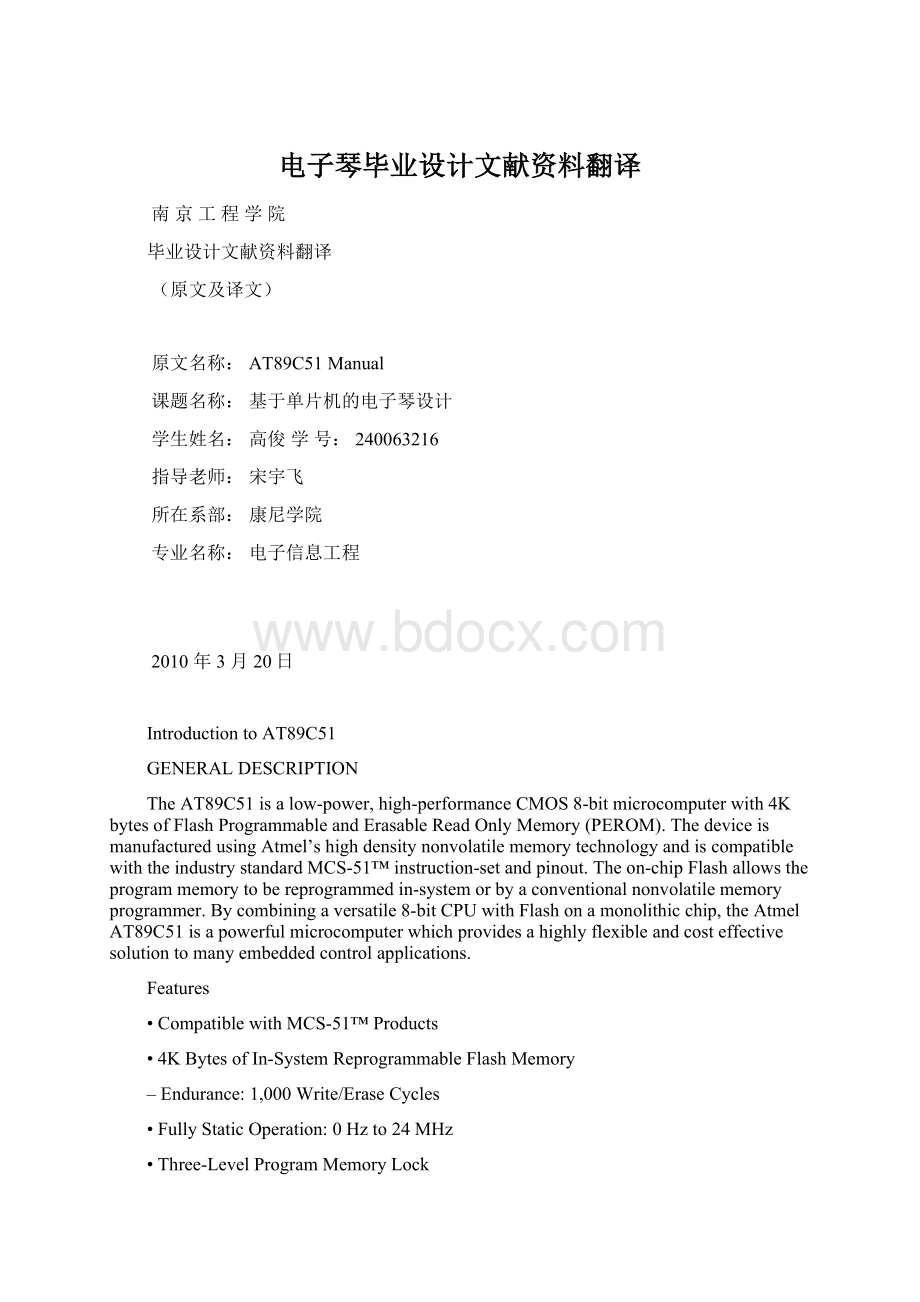电子琴毕业设计文献资料翻译Word文件下载.docx
《电子琴毕业设计文献资料翻译Word文件下载.docx》由会员分享,可在线阅读,更多相关《电子琴毕业设计文献资料翻译Word文件下载.docx(11页珍藏版)》请在冰豆网上搜索。

专业名称:
电子信息工程
2010年3月20日
IntroductiontoAT89C51
GENERALDESCRIPTION
TheAT89C51isalow-power,high-performanceCMOS8-bitmicrocomputerwith4KbytesofFlashProgrammableandErasableReadOnlyMemory(PEROM).ThedeviceismanufacturedusingAtmel’shighdensitynonvolatilememorytechnologyandiscompatiblewiththeindustrystandardMCS-51™instruction-setandpinout.Theon-chipFlashallowstheprogrammemorytobereprogrammedin-systemorbyaconventionalnonvolatilememoryprogrammer.Bycombiningaversatile8-bitCPUwithFlashonamonolithicchip,theAtmelAT89C51isapowerfulmicrocomputerwhichprovidesahighlyflexibleandcosteffectivesolutiontomanyembeddedcontrolapplications.
Features
•CompatiblewithMCS-51™Products
•4KBytesofIn-SystemReprogrammableFlashMemory
–Endurance:
1,000Write/EraseCycles
•FullyStaticOperation:
0Hzto24MHz
•Three-LevelProgramMemoryLock
•128x8-BitInternalRAM
•32ProgrammableI/OLines
•Two16-BitTimer/Counters
•SixInterruptSources
•ProgrammableSerialChannel
•LowPowerIdleandPowerDownModes
TheAT89C51providesthefollowingstandardfeatures:
4KbytesofFlash,128bytesofRAM,32I/Olines,two16-bittimer/counters,afivevectortwo-levelinterruptarchitecture,afullduplexserialport,on-chiposcillatorandclockcircuitry.Inaddition,theAT89C51isdesignedwithstaticlogicforoperationdowntozerofrequencyandsupportstwosoftwareselectablepowersavingmodes.TheIdleModestopstheCPUwhileallowingtheRAM,timer/counters,serialportandinterruptsystemtocontinuefunctioning.ThePower-downModesavestheRAMcontentsbutfreezestheoscillatordisablingallotherchipfunctionsuntilthenexthardwarereset.
VCC
Supplyvoltage.
GND
Ground.
Port0
Port0isan8-bitopen-drainbi-directionalI/Oport.Asanoutputport,eachpincansinkeightTTLinputs.When1sarewrittentoport0pins,thepinscanbeusedashigh-impedanceinputs.
Port0mayalsobeconfiguredtobethemultiplexedlow-orderaddress/databusduringaccessestoexternalprogramanddatamemory.InthismodeP0hasinternalpullups.
Port0alsoreceivesthecodebytesduringFlashprogramming,andoutputsthecodebytesduringprogramverification.Externalpullupsarerequiredduringprogramverification.
Port1
Port1isan8-bitbi-directionalI/Oportwithinternalpullups.ThePort1outputbufferscansink/sourcefourTTLinputs.When1sarewrittentoPort1pinstheyarepulledhighbytheinternalpullupsandcanbeusedasinputs.Asinputs,Port1pinsthatareexternallybeingpulledlowwillsourcecurrent(IIL)becauseoftheinternalpullups.Port1alsoreceivesthelow-orderaddressbytesduringFlashprogrammingandverification.
Port2
Port2isan8-bitbi-directionalI/Oportwithinternalpullups.ThePort2outputbufferscansink/sourcefourTTLinputs.When1sarewrittentoPort2pinstheyarepulledhighbytheinternalpullupsandcanbeusedasinputs.Asinputs,Port2pinsthatareexternallybeingpulledlowwillsourcecurrent(IIL)becauseoftheinternalpullups.
Port2emitsthehigh-orderaddressbyteduringfetchesfromexternalprogrammemoryandduringaccessestoexternaldatamemorythatuse16-bitaddresses(MOVX@DPTR).Inthisapplication,itusesstronginternalpullupswhenemitting1s.Duringaccessestoexternaldatamemorythatuse8-bitaddresses(MOVX@RI),Port2emitsthecontentsoftheP2SpecialFunctionRegister.Port2alsoreceivesthehigh-orderaddressbitsandsomecontrolsignalsduringFlashprogrammingandverification.
Port3
Port3isan8-bitbi-directionalI/Oportwithinternalpullups.ThePort3outputbufferscansink/sourcefourTTLinputs.When1sarewrittentoPort3pinstheyarepulledhighbytheinternalpullupsandcanbeusedasinputs.Asinputs,Port3pinsthatareexternallybeingpulledlowwillsourcecurrent(IIL)becauseofthepullups.Port3alsoservesthefunctionsofvariousspecialfeaturesoftheAT89C51aslistedbelow:
Port3alsoreceivessomecontrolsignalsforFlashprogrammingandverification.
RST
Resetinput.Ahighonthispinfortwomachinecycleswhiletheoscillatorisrunningresetsthedevice.
ALE/PROG
AddressLatchEnableoutputpulseforlatchingthelowbyteoftheaddressduringaccessestoexternalmemory.Thispinisalsotheprogrampulseinput(PROG)duringFlashprogramming.InnormaloperationALEisemittedataconstantrateof1/6theoscillatorfrequency,andmaybeusedforexternaltimingorclockingpurposes.Note,however,thatoneALEpulseisskippedduringeachaccesstoexternalData
Memory.
Ifdesired,ALEoperationcanbedisabledbysettingbit0ofSFRlocation8EH.Withthebitset,ALEisactiveonlyduringaMOVXorMOVCinstruction.Otherwise,thepinisweaklypulledhigh.SettingtheALE-disablebithasnoeffectifthemicrocontrollerisinexternalexecutionmode.
PSEN
ProgramStoreEnableisthereadstrobetoexternalprogrammemory.WhentheAT89C51isexecutingcodefromexternalprogrammemory,PSENisactivatedtwiceeachmachinecycle,exceptthattwoPSENactivationsareskippedduringeachaccesstoexternaldatamemory.
EA/VPP
ExternalAccessEnable.EAmustbestrappedtoGNDinordertoenablethedevicetofetchcodefromexternalprogrammemorylocationsstartingat0000HuptoFFFFH.Note,however,thatiflockbit1isprogrammed,EAwillbeinternallylatchedonreset.EAshouldbestrappedtoVCCforinternalprogramexecutions.Thispinalsoreceivesthe12-voltprogrammingenablevoltage(VPP)duringFlashprogramming,forpartsthatrequire12-voltVPP.
XTAL1
Inputtotheinvertingoscillatoramplifierandinputtotheinternalclockoperatingcircuit.
XTAL2
Outputfromtheinvertingoscillatoramplifier.OscillatorCharacteristics
XTAL1andXTAL2aretheinputandoutput,respectively,ofaninvertingamplifierwhichcanbeconfiguredforuseasanon-chiposcillator,asshowninFigure1.Eitheraquartzcrystalorceramicresonatormaybeused.Todrivethedevicefromanexternalclocksource,XTAL2shouldbeleftunconnectedwhileXTAL1isdrivenasshowninFigure2.Therearenorequirementsonthedutycycleoftheexternalclocksignal,sincetheinputtotheinternalclockingcircuitryisthroughadivide-by-twoflip-flop,butminimumandmaximumvoltagehighandlowtimespecificationsmustbeobserved.
IdleMode
Inidlemode,theCPUputsitselftosleepwhilealltheon-chipperipheralsremainactive.Themodeisinvokedbysoftware.Thecontentoftheon-chipRAMandallthespecialfunctionsregistersremainunchangedduringthismode.Theidlemodecanbeterminatedbyanyenabledinterruptorbyahardwarereset.Itshouldbenotedthatwhenidleisterminatedbyahardwarereset,thedevicenormallyresumesprogramexecution,fromwhereitleftoff,uptotwomachinecyclesbeforetheinternalresetalgorithmtakescontrol.On-chiphardwareinhibitsaccesstointernalRAMinthisevent,butaccesstotheportpinsisnotinhibited.ToeliminatethepossibilityofanunexpectedwritetoaportpinwhenIdleisterminatedbyreset,theinstructionfollowingtheonethatinvokesIdleshouldnotbeonethatwritestoaportpinortoexternalmemory.
Figure1.OscillatorConnections
Figure2.ExternalClockDriveConfiguration
AT89C51的介绍
综合描述
AT89C51是美国ATMEL公司生产的低功耗,高性能CMOS8位单片机,片内含4kbytes的可系统编程的Flash只读程序存储器,器件采用ATMEL公司的高密度、非易失性存储技术生产,兼容标准8051指令系统及引脚。
由于将多功能8位CPU和闪烁存储器组合在单个芯片中,ATMEL的AT89C51是一种高效微控制器,AT89C51是它的一种精简版本。
AT89C51单片机为很多嵌入式控制系统提供了一种灵活性高且价廉的方案,可为您提供许多高性价比的应用场介,可灵活应用于各种控制领域。
AT89C51具有如下特点:
40个引脚,4kBytesFlash片内程序存储器,128bytes的随机存取数据存储器(RAM),32个外部双向输入/输出(I/O)口,5个中断优先级2层中断嵌套中断,2个16位可编程定时计数器,2个全双工串行通信口,看门狗(WDT)电路,片内时钟振荡器。
此外,AT89C51设计和配置了振荡频率可为0Hz并可通过软件设置省电模式。
空闲模式下,CPU暂停工作,而RAM定时计数器,串行口,外中断系统可继续工作,掉电模式冻结振荡器而保存RAM的数据,停止芯片其它功能直至外中断激活或硬件复位。
同时该芯片还具有PDIP、TQFP和PLCC等三种封装形式,以适应不同产品的需求。
主要特性:
·
与MCS-51兼容
4K字节可编程闪烁存储器
寿命:
1000写/擦循环
数据保留时间:
10年
全静态工作:
0Hz-24MHz
三级程序存储器锁定
128×
8位内部RAM
32可编程I/O线
两个16位定时器/计数器
5个中断源
可编程串行通道
低功耗的闲置和掉电模式
片内振荡器和时钟电路
功能特性概述:
AT89C51提供以下标准功能:
4k字节Flash闪速存储器,128字节内部RAM,32个I/O口线,看门狗(WDT),两个数据指针,两个16位定时/计数器,一个5向量两级中断结构,一个全双工串行通信口,片内振荡器及时钟电路。
同时,AT89C51可降至0Hz的静态逻辑操作,并支持两种软件可选的节电工作模式。
空闲方式停止CPU的工作,但允许RAM,定时/计数器,串行通信口及中断系统继续工作。
掉电方式保存RAM中的内容,但振荡器停止工作并禁止其它所有部件工作直到下一个硬件复位。
引脚功能说明:
VCC:
供电电压。
GND:
接地。
P0口:
P0口为一个8位漏级开路双向I/O口,每脚可吸收8TTL门电流。
当P1口的管脚第一次写1时,被定义为高阻输入。
P0能够用于外部程序数据存储器,它可以被定义为数据/地址的第八位。
在FIASH编程时,P0口作为原码输入口,当FIASH进行校验时,P0输出原码,此时P0外部必须被拉高。
P1口:
P1口是一个内部提供上拉电阻的8位双向I/O口,P1口缓冲器能接收输出4TTL门电流。
P1口管脚写入1后,被内部上拉为高,可用作输入,P1口被外部下拉为低电平时,将输出电流,这是由于内部上拉的缘故。
在FLASH编程和校验时,P1口作为第八位地址接收。
P2口:
P2口为一个内部上拉电阻的8位双向I/O口,P2口缓冲器可接收,输出4个TTL门电流,当P2口被写“1”时,其管脚被内部上拉电阻拉高,且作为输入。
并因此作为输入时,P2口的管脚被外部拉低,将输出电流。
这是由于内部上拉的缘故。
P2口当用于外部程序存储器或16位地址外部数据存储器进行存取时,P2口输出地址的高八位。
在给出地址“1”时,它利用内部上拉优势,当对外部八位地址数据存储器进行读写时,P2口输出其特殊功能寄存器的内容。
P2口在FLASH编程和校验时接收高八位地址信号和控制信号。
P3口:
P3口管脚是8个带内部上拉电阻的双向I/O口,可接收输出4个TTL门电流。
当P3口写入“1”后,它们被内部上拉为高电平,并用作输入。
作为输入,由于外部下拉为低电平,P3口将输出电流(ILL)这是由于上拉的缘故。
P3口也可作为AT89C51的一些特殊功能口,如下表所示:
P3.0RXD(串行输入口)
P3.1TXD(串行输出口)
P3.2/INT0(外部中断0)
P3.3/INT1(外部中断1)
P3.4T0(记时器0外部输入)
P3.5T1(记时器1外部输入)
P3.6/WR(外部数据存储器写选通)
P3.7/RD(外部数据存储器读选通)
P3口同时为闪烁编程和编程校验接收一些控制信号。
RST:
复位输入。
当振荡器复位器件时,要保持RST脚两个机器周期的高电平时间。
ALE/PROG:
当访问外部存储器时,地址锁存允许的输出电平用于锁存地址的地位字节。
在FLASH编程期间,此引脚用于输入编程脉冲。
在平时,ALE端以不变的频率周期输出正脉冲信号,此频率为振荡器频率的1/6。
因此它可用作对外部输出的脉冲或用于定时目的。
然而要注意的是:
每当用作外部数据存储器时,将跳过一个ALE脉冲。
如想禁止ALE的输出可在SFR8EH地址上置0。
此时,ALE只有在执行MOVX,MOVC指令是ALE才起作用。
另外,该引脚被略微拉高。
如果微处理器在外部执行状态ALE禁止,置位无效。
/PSEN:
外部程序存储器的选通信号。
在由外部程序存储器取指期间,每个机器周期两次/PSEN有效。
但在访问外部数据存储器时,这两次有效的/PSEN信号将不出现。
/EA/VPP:
当/EA保